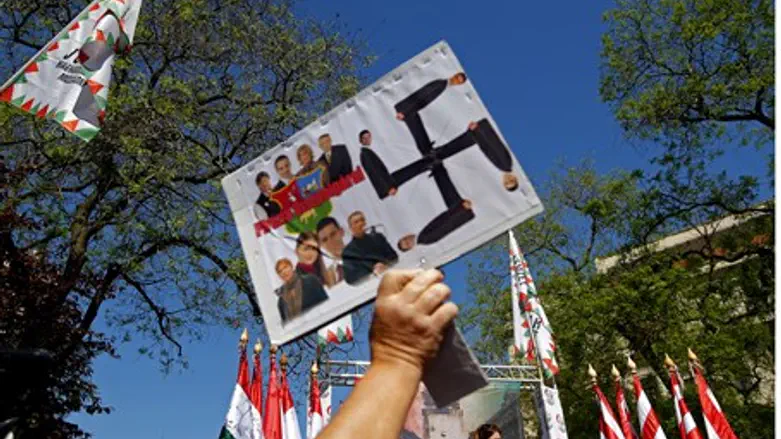
Known for its anti-Semitic and anti-Roma rhetoric, Hungary's Jobbik party is trying to shed its far-right image and appeal to a younger audience as it heads into Sunday's general election.
Jobbik posters now try to portray its members as softer and more modern. Some even show smiling candidates holding kittens.
"You can't stop the future," Gabor Vona, the party's 35-year-old leader, says in one promotional video as young people in the background play football in a park.
At the last election in 2010, Jobbik won around 17 percent of the vote behind Prime Minister Viktor Orban's right-wing Fidesz party and the center-left Socialists, following a campaign littered with radical and nationalist slogans.
Current polls suggest it will achieve a similar result in Sunday's election, with Fidesz still leading comfortably.
But Jobbik has rallied from a slump in popularity over the past couple of years thanks largely to its attempts at an image make-over, and there is even talk it may sneak into second place ahead of the Socialists.
More than any other party, Jobbik has made canny use of social media like Facebook. With some 250,000 "likes" it is far ahead of second-place Fidesz with 160,000.
"Our support would rocket if we got proper media coverage," said Gergely Farkas, Jobbik youth leader and Hungary's youngest lawmaker at 28. "People are fed up with political correctness. Jobbik will take over power sooner or later."
Conspicuously absent from Jobbik's marketing campaign are people like Istvan Meszaros, a candidate from Baja on the Serbian border. \
Meszaros is the leader of the New Hungarian Guard, a controversial vigilante group that has held torchlit marches in Roma neighborhoods, much like its predecessor, the Hungarian Guard, which was banned in 2009.
"Jobbik offers action, not just talk. Crime falls in those areas after (the marches)," he told AFP at the Baja constituency office, sat beside a bust of Hungary's interwar leader and far-right icon Miklos Horthy.
He admits the new campaign has left him puzzled. "But I'm sure the campaign managers know what they're doing," he said.
Nonetheless, his very presence on the list shows the party has not fully abandoned its earlier ways.
"Having Meszaros as a candidate keeps their more extreme voters on board," said Kristof Domina, head of Athena Institute, a far-right watchdog.
Rebranding away from extremism
Analysts say Jobbik's recent image makeover has reversed an erosion in support since the last general election, when Fidesz took over much of the nationalist rhetoric.
"They decided around a year ago they had to rebrand away from extremism in order to survive and grow," said Domina.
After a mid-term slump, polls indicate that Jobbik, buoyed by their slick new election campaign, is again hovering around 15-18 percent.
But behind the modern campaign, the same policies remain.
The party's bulky manifesto still presents a mixture of economic nationalism and hardline law and order, including a call for the reinstatement of the death penalty and a heavy emphasis on so-called "Gypsy crime".
In February, the party held a rally in a former synagogue - another symbolic message to its hardcore base, according to Domina.
One of the men at the rally in Esztergom in northern Hungary was Sandor Porzse, a Jobbik deputy whose anti-Semitic remarks have been compared to Nazism by a Facebook group called "Vote Against Jobbik".
"We are victims of a worldwide Jewish conspiracy that wants to colonize us and steal our resources," the group quoted him as saying in a video posted on Youtube.
The party notably makes use of several Nazi symbols, including the Árpád stripes, which were initially used by the Hungarian Nazi Arrow Cross, which collaborated with Nazi Germany and was instrumental in the deportation and murder of 400,000 Hungarian Jews.
In 2009, Jobbik MP Krisztina Morvai sent an open letter to Israel’s ambassador to Hungary, in which she detailed her joy at the deaths of Israeli soldiers killed by Hamas terrorists in Gaza.
"The only way to talk to people like you is by assuming the style of Hamas. I wish all of you lice-infested, dirty murderers will receive Hamas’ ‘kisses'," she wrote.
In 2012 a Jobbik deputy called for a list of Jewish nationals to be drawn up for "national security reasons".
Created just three weeks ago, the campaign "Vote Against Jobbik" has already gained almost 17,000 likes.
"Many people who have been won over by Jobbik's new image might not know that there is also a neo-Nazi side to them," Mate Kulifai, one of the young people behind the group, told AFP.
"We don't care who people vote for, as long as it's not Jobbik."
Arutz Sheva Staff contributed to this report